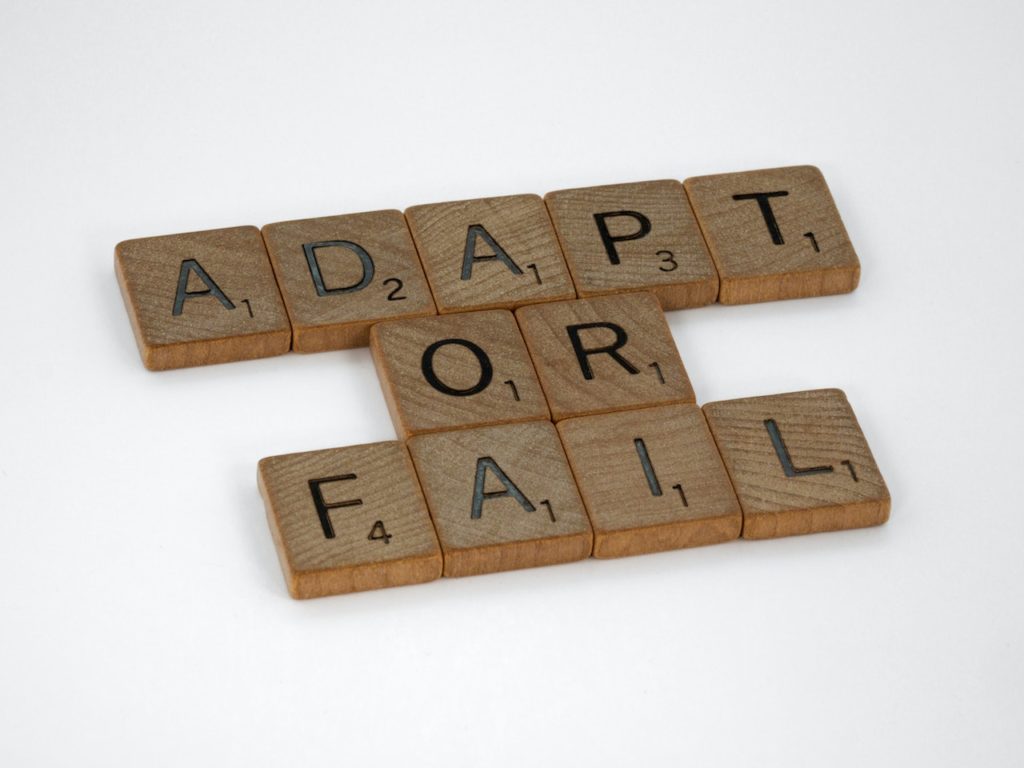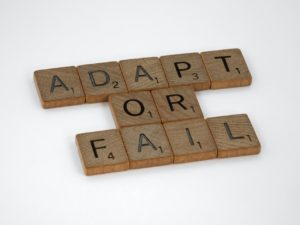- Understanding Adaptability: More Than Just Survival
- The Power of Adaptability in Today's World
- Strengthening Your Adaptability Muscle: Practical Tips
- Making Adaptability a Habit: Everyday Practices
- Quotes to Inspire Adaptability
- Recommended Books on Adaptability
- Adaptability: Your Ally in a Changing World
- Interactive Section: Assess Your Adaptability
- Conclusion: Embracing the Power of Adaptability
Life is a constantly evolving landscape of opportunities, challenges, and change. From global events to personal milestones, the shifting paradigms we face demand adaptability – a trait that, although daunting to some, can be honed and improved over time.
This blog post will delve into the world of adaptability, exploring its relevance in today’s rapidly changing world, while providing you with insightful tips on how to enhance this valuable attribute.

Understanding Adaptability: More Than Just Survival
Adaptability isn’t merely about survival—it’s about thriving in any environment, regardless of the circumstances. It’s the ability to adjust our thoughts, behaviours, and actions in response to change. It’s about learning new skills, embracing unfamiliar perspectives, and remaining open and responsive to the myriad of life’s experiences.
The Power of Adaptability in Today’s World
In a world where change is the only constant, adaptability is no longer a desirable trait—it’s a necessity. Here’s why:
Rapid Technological Progress
The technology landscape is changing at an exponential rate, with new tools, applications, and platforms being introduced daily. Adaptability enables us to learn, understand, and use these new technologies effectively.
Globalization
In our increasingly connected world, cultural adaptability is key. The ability to understand, respect, and adapt to different cultures and traditions is crucial in promoting effective communication and collaboration.
The Changing Nature of Work
The traditional nine-to-five model of work is evolving, with flexible work schedules, remote working, and gig economies on the rise. Adaptability helps us adjust to these changes, ensuring we can perform effectively in diverse work environments.
Strengthening Your Adaptability Muscle: Practical Tips
Improving adaptability isn’t about preparing for every possible scenario—it’s about developing an adaptable mindset that can deal with any situation. Here are some strategies to cultivate adaptability:
Foster a Growth Mindset
Carol Dweck, the renowned psychologist, asserts that individuals with a growth mindset, those who believe they can develop their abilities, are more likely to embrace change and face challenges with tenacity. Cultivate a growth mindset by embracing mistakes as learning opportunities and challenging yourself to step outside your comfort zone.
Embrace Lifelong Learning
Continuous learning is a cornerstone of adaptability. Whether it’s learning a new skill, a new language, or simply staying updated with industry trends, lifelong learning keeps your mind flexible and ready to adapt.
Cultivate Emotional Intelligence
Emotional intelligence is the ability to understand and manage your emotions and those of others. By developing emotional intelligence, you can better handle the stress and emotions that come with change, making it easier to adapt.
Improve Decision-making Skills
Changes often require quick decisions. Improving your decision-making skills, including learning to take calculated risks and making informed choices, can increase your adaptability.
Practice Mindfulness
Mindfulness is about staying present and aware of your thoughts, feelings, and surroundings. Practising mindfulness can help you remain open to change and adapt more readily by acknowledging your feelings and fears without letting them control your actions.

Making Adaptability a Habit: Everyday Practices
Challenge Your Routine
Engage in new activities, meet new people, or simply change up your daily routine. This can help you become more comfortable with change and enhance your adaptability.
Learn to Let Go
Change often means letting go of old habits, routines, and sometimes even people. Learning to let go can make the transition smoother and help you adapt more quickly.
Be Proactive
Instead of waiting for change to happen, seek it out. Take on new challenges, set stretch goals, and take calculated risks.
Practice Resilience
Resilience is about bouncing back from setbacks and failures. By practising resilience, you can more easily adjust to new circumstances and recover from changes.
Quotes to Inspire Adaptability
Sometimes, all we need is a few well-chosen words to inspire us towards adaptability. Here are some thought-provoking quotes from respected figures across various fields:
1. Charles Darwin, naturalist, geologist, and biologist known for his contributions to the science of evolution: “It is not the strongest of the species that survives, nor the most intelligent; it is the one most adaptable to change.“
2. Bruce Lee, martial artist, actor, and philosopher: “Be water, my friend. Empty your mind. Be formless, shapeless — like water. You put water into a cup, it becomes the cup.“
3. Maya Angelou, poet and civil rights activist: “You may not control all the events that happen to you, but you can decide not to be reduced by them.“
4. Stephen Hawking, theoretical physicist and cosmologist: “Intelligence is the ability to adapt to change.“
5. Albert Einstein, physicist: “The measure of intelligence is the ability to change.“
6. Max McKeown, business author, consultant, and researcher: “Adaptability is about the powerful difference between adapting to cope and adapting to win.”
7. Peter Drucker, management consultant, educator, and author: “The greatest danger in times of turbulence is not the turbulence; it is to act with yesterday’s logic.”
These quotes offer wisdom and encouragement for those times when you find yourself facing a new challenge or an unexpected turn of events. Use them as a source of inspiration, and remember that your ability to adapt is one of your greatest assets.
Recommended Books on Adaptability
If you’re looking to delve deeper into the subject of adaptability, here are some insightful books that can serve as your guide:
1. “Who Moved My Cheese?” by Spencer Johnson: This classic allegorical tale beautifully illustrates the importance of adaptability. Through the story of four characters living in a maze, the book delivers a profound message about how to deal with change in our work and lives.
2. “Mindset: The New Psychology of Success” by Carol Dweck: In this groundbreaking work, psychologist Carol Dweck explores the concept of ‘mindset’ and shows how our beliefs can impact our ability to adapt to change. Dweck introduces the idea of ‘fixed’ and ‘growth’ mindsets, with the latter being key to embracing adaptability.
3. “Adapt: Why Success Always Starts with Failure” by Tim Harford: Harford argues that success often happens when we learn to adapt, and it usually comes after failure. The book is a guide to navigating our complex, unpredictable, and ever-changing world.
4. “Resilience: Hard-Won Wisdom for Living a Better Life” by Eric Greitens: As a former Navy SEAL, Greitens knows a thing or two about resilience and adaptability. This book compiles a series of powerful letters that Greitens wrote to a friend struggling with life, offering a masterclass in navigating life’s difficulties.
5. “Switch: How to Change Things When Change Is Hard” by Chip and Dan Heath: The Heath brothers, in this insightful book, present compelling research from psychology and sociology to explain why change is difficult and how to make it easier.
6. “Antifragile: Things That Gain from Disorder” by Nassim Nicholas Taleb: This book introduces the concept of ‘antifragility,’ the ability to benefit and grow from volatility and change. Taleb explores how we can apply this concept in various aspects of our lives.
These books provide valuable perspectives and tools for understanding and enhancing your adaptability. They offer practical insights to not just cope with change, but to leverage it for personal growth and success. Happy reading!
Adaptability: Your Ally in a Changing World
In the face of life’s constant changes, adaptability is a valuable skill—one that can be strengthened and honed with time and practice. By fostering a growth mindset, embracing lifelong learning, and practising resilience, we can face any challenge head-on and emerge stronger.
Remember, change is a part of life. Embracing it with adaptability not only helps us survive but also thrive, finding opportunities where others see obstacles. So, step out of your comfort zone, challenge your routines, learn new skills, and most importantly, embrace change—it’s the only way to stay ahead in this rapidly evolving world.

Interactive Section: Assess Your Adaptability
Take a moment to assess your adaptability skills with this brief interactive self-assessment. Remember, this is not a test—it’s simply a tool to help you understand your current adaptability levels and areas where you might want to focus your efforts for improvement.
1. I easily adjust when plans or circumstances change.
– Always
– Often
– Sometimes
– Rarely
– Never
2. I am open to learning new things.
– Always
– Often
– Sometimes
– Rarely
– Never
3. I can stay calm and composed during times of uncertainty.
– Always
– Often
– Sometimes
– Rarely
– Never
4. I can make decisions swiftly when needed.
– Always
– Often
– Sometimes
– Rarely
– Never
5. I feel comfortable with unfamiliar tasks or environments.
– Always
– Often
– Sometimes
– Rarely
– Never
Scoring:
Assign each response a number from 1 to 5:
Always (5), Often (4), Sometimes (3), Rarely (2), Never (1).
Interpretation:
– 21-25 points: You are highly adaptable. Keep cultivating your adaptability skills and share your strategies with others.
– 16-20 points: You show a good level of adaptability. Identify areas for improvement to become even more adaptable.
– 11-15 points: You sometimes struggle with change. Consider working on your adaptability skills.
– 5-10 points: You find it difficult to adapt to change. Consider focusing on enhancing your adaptability. Reading books, attending workshops, or working with a coach could be beneficial.
Remember, adaptability is not a fixed trait. With conscious effort and practice, you can enhance your ability to navigate change effectively. Let this quiz serve as your starting point to a more adaptable you!

Conclusion: Embracing the Power of Adaptability
In an ever-changing world, adaptability is more than just a skill—it’s a lifeline. It’s our key to navigating through the tides of change and emerging stronger on the other side. From personal growth to professional success, adaptability impacts every facet of our lives.
But remember, adaptability isn’t just about weathering storms—it’s about learning to dance in the rain. It’s not just about surviving change but using it as a launchpad for growth and development.
Whether you’re already highly adaptable or just beginning your journey towards becoming more so, it’s never too late to develop this critical ability. Use the strategies and insights shared in this blog post to nurture your adaptability. Embrace a growth mindset, commit to lifelong learning, practice resilience, and most importantly, approach change with an open heart and an open mind.
In the end, it’s not the strongest or the most intelligent who will thrive—it’s those who are most adaptable to change. So, gear up, lean into the winds of change, and let your adaptability carry you forward.

